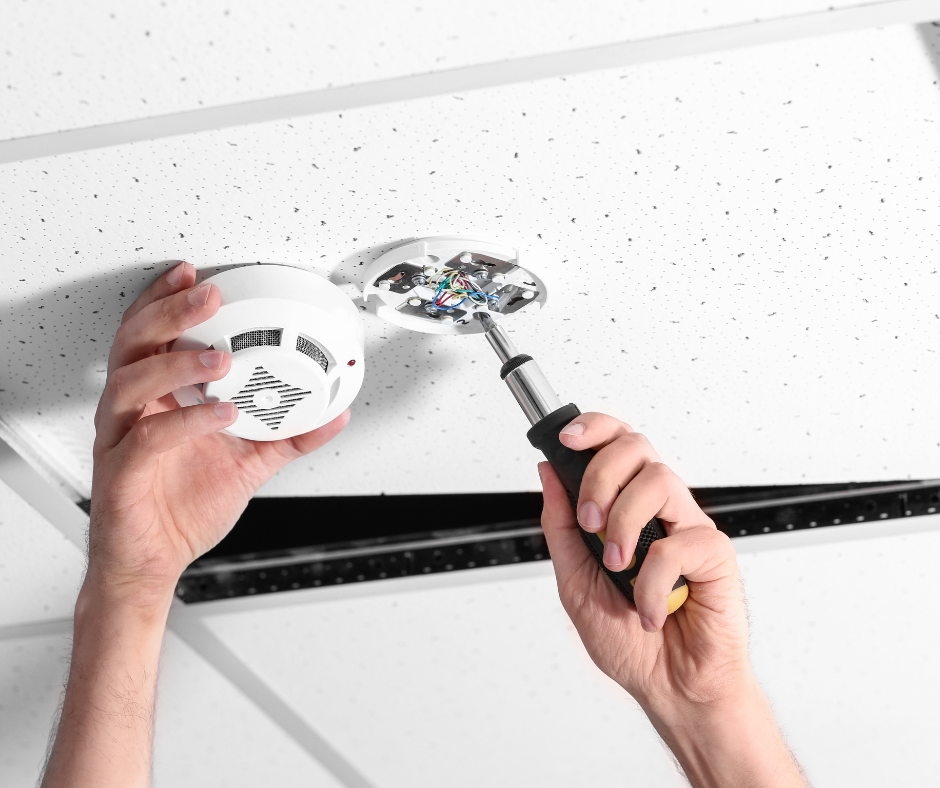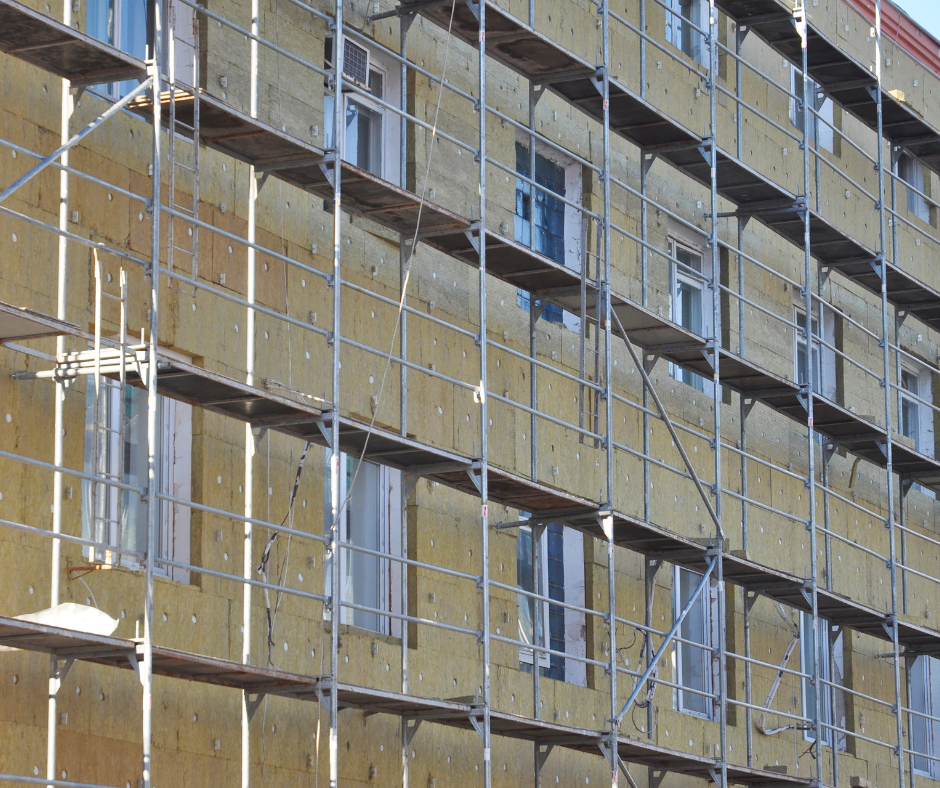Fires are always a concern for both homeowners and landlords, and the events in the last few years have put these concerns in the forefront of our thoughts. Read this below to find out the importance and the requirements to interlink smoke alarms as a landlords.
7 reasons why having interlinked smoke alarms are important in flats and HMOs
If you’re a landlord or homeowner, you know how important it is to have working smoke alarms in your property. But did you know that having interlinked smoke alarms is even more important? Here are 7 reasons why
1. Interlinked smoke alarms give you an early warning of a fire
2. They can help to prevent a fire from spreading by alerting all occupants to the danger
3. They’re less likely to be disabled by accident than standalone alarms
4. If one alarm goes off, all of the others will as well so everyone in the property knows there’s a problem
5. You can install them in hard-to-reach places, like under the kitchen sink or in the loft, where they can still warn you of a fire even if you’re not in the same room as it starts
6. They’re an extra layer of protection for your property and your tenants or guests
7. And finally, they may even save you money on your insurance premiums!
Smoke alarms save lives
Every year smoke alarms save countless lives, ensuring that families and communities can be alerted for smoke and fire breakout. While smoke alarms are mainly powered by batteries, smoke alarms wired to mains is becoming more popular as a form of smoke detection.
Advances in smoke alarm technology have also seen smoke alarms being interlinked so that smoke alerts can be activated through all rooms within a house. This makes smoke alarms even more effective as danger arising in one room can be quickly detected across the house.
Smoke alarms are now often combined with heat sensors to increase the efficacy of detecting dangerous smoke and flames. All these developments ensure that smoke alarms remain an effective and reliable tool in protecting homes from fires.
Smoke Alarms are a legal requirement in rental properties
Smoke alarms are an essential tool for keeping tenants safe, and here in the UK smoke alarm regulations require that a smoke alarm be installed in any rented property.
It is is a legal requirement for landlords and tenants alike ensuring smoke alarms are installed and checked frequently in order to save lives in case of an emergency.
In addition, smoke detectors reduce the risk of fires breaking out in residential properties, acting as an early warning system to alert occupants to hazardous smoke before it spreads. The law requires smoke alarms installed on every storey of rental premises; however smoke alarm installation should be viewed as more than just ticking a box towards compliance – it should instead be viewed as an important part of providing a secure rental environment to all involved parties.
Smoke alarms in apartment blocks and HMOs
HMOs (Houses of Multiple Occupancy) and flats can be a fire hazard due to the shared walls, floors and ceilings between different dwellings.
All HMOs should fit interlinked smoke alarms designed to detect any signs of fires quickly. Not only are early warning systems offered by interlinked smoke alarms beneficial for HMO tenants but they also save on costs associated with replacing property and belongings that have been damaged.
Interlinked Smoke Alarms can be wired or wireless
Smoke alarms are an incredibly important safety measure for any home, and mains wired and wireless varieties offer ultimate peace of mind. Mains wired smoke alarms are connected to mains electricity or a battery backup and detect smoke particles in the air; when providing ample warning, they can be invaluable in alerting a household of danger.
Alternatively wireless smoke detectors often use radio frequency to transmit messages with other detectors and send warnings to mobile devices. Interlinked mains-wired and wireless alarms provide coverage over large areas as well as having the advantage of allowing one detector to set off all the alarms at once.
They can be interconnected so that all alarms sound in the event of a fire
Fire alarms can provide an essential warning if a fire was to occur, and if multiple alarms are interconnected, the alert is even more effective. This means that if a fire occurred in any part of a building, maybe even from another building on the same property, all connected alarm systems would sound simultaneously.
With such early warning capability, everyone has more time to evacuate before any harmful smoke or gas could develop. Interconnected fire alarms are a critical tool for minimizing damage and harm caused by fires.
What are the tenant’s responsibilities for testing smoke alarms
A tenant’s responsibility is to ensure smoke alarms throughout the property are tested regularly to make sure they are working. Smoke alarms are vital for detecting fires quickly and helping reduce the risk of fire-related injury and death.
The testing should be done monthly and tenants should replace the batteries once a year or as soon as you notice an alarm making noises other than when testing.
If you have detectors installed, such as carbon monoxide detectors, it is important to test them as well.
Responsibilities of HMO Landlords Regarding Smoke Alarms
If you own an HMO, you must install at least one smoke alarm on each level of the house where there are rooms used as living accommodation. A loft used only for occasional storage would not require one, but most floors of an HMO would. You should be aware that this is the bare minimum, and it may be prudent to instal additional smoke alarms depending on the layout of your home.
There are no specific rules regarding the type of smoke alarm you must instal in your HMO, but it is usually preferable to have proper wired ones installed rather than relying on cheap stick-on alarms that will constantly bleep at your tenants to notify them that the battery is low. The main purpose of a smoke alarm is to keep your tenants and property safe, not to check a legal box, and there’s no point in installing one if the tenant ends up taking the battery out.
Another legal requirement is that you test your smoke alarms on the first day of the tenancy to ensure they are operational. It is preferable to do it in the presence of the tenants during check-in and inventory. Once the tenants have moved in, it is their responsibility to check the alarms on a regular basis, though you must arrange for repairs or replacements if they discover any problems.
What other alarms should be fitted?
Home safety is always a priority and having the right alarms in place can prevent dangerous or life-threatening situations.
In addition to smoke alarms, severe carbon monoxide poisoning can be prevented if co detectors are installed in the home. These co detectors will alert occupants if harmful levels of Carbon Monoxide are present in their environment.
For those looking for an extra layer of protection, combined smoke and co alarms give dual protection in one device, adding an additional level of safety for your family.
Why are smoke alarms in communal areas and HMOs so important
Smoke alarms are a vital safety feature in any communal area or House of Multiple Occupancy (HMO), as they provide early warning of any fire that might occur.
Such safety devices are effective in signalling the potential danger, prompting the action needed to prevent further damage and alert those at risk of being caught off guard by the flames.
They can potentially save lives by either containing or completely eliminating the threat before it can cause too much harm. The alarm also serves as a reminder for fire safety – providing occupants a sense of security while also keeping them vigilant with regards to safety protocols.
Therefore, having reliable smoke detectors located in key areas within communal areas and HMOs is paramount to ensuring safety without compromising on convenience.
How to install interlinked smoke alarms in your property
Property owners should consider having mains wired or wireless interlinked smoke alarms installed in their property for improved fire safety. Mains wired smoke alarms, wired to mains power with a battery back-up, are an efficient way of providing complete coverage of your home from the moment you install them.
Wireless interlinked smoke alarms wirelessly link several main units and for room-to-room coverage, and can provide additional protection by connecting your smoke alarms to a control panel which can be programmed to test, hush and reset them all at once.
The bottom line is that interlinked mains wired or wireless smoke alarms fitted throughout your property will offer superior fire protection and peace of mind.
Why you should regularly test your smoke alarms to ensure they are working properly
The landlord or tenant should regularly test smoke alarms as part of a routine fire safety check. It is important to do this because it helps to ensure that, in the event of a fire, everyone inside the building would be alerted and have time to get out safely.
Testing the alarm is an easy process – simply press the button on your alarm, and you should hear a loud sound coming from it indicating that it is working properly.
Doing this test once per month is generally recommended for optimal safety. By ensuring the alarms are in good working order fires can be detected in their earliest stages, allowing for faster evacuation times which can save many lives.
For landlords and tenants alike, testing smoke alarms regularly should definitely be a priority when ensuring good safety standards within their building.
Landlords are responsible for the safety of their tenants and should ensure that their property is equipped with interlinked smoke alarms
Interlinked smoke alarms provide early detection of fires, which can save lives. -They also improve safety for tenants by providing an audible warning if a fire occurs in another part of the building
Installation is relatively easy and battery operated smoke alarms can be installed by anyone
Landlords should test their smoke alarms at the start of tenancy and tenants should continue to test the alarms every month during the tenancy to ensure they are working properly.
Conclusion: Smoke alarms are an important part of home safety. They provide an early warning in the event of a fire, help to contain fires, and are required by law . Some smoke alarms can also be combined carbon monoxide detectors, which can save lives.
Contact us for any advice or to discuss your installation needs.



